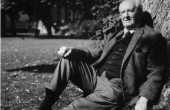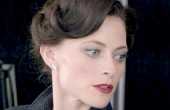Erin Derwin
Erin graduated from Hamline University with a B.A. in English. Since graduating she has worked in publication and is now teaching English. She currently resides in Japan.
Junior Contributor II
- Lurker
- Pssst
- Sharp-Eyed Citizen
- ?
- Articles
2 - Featured
1 - Comments
13
- Ext. Comments
11 - Processed
2 - Revisions
2
- Topics
3 - Topics Taken
0 - Notes
11
- Topics Proc.
1 - Topics Rev.
0
- Points
268 - Rank
X - Score
143
Latest Articles
Latest Topics
Crimson Peak: Victorian RevivalIn an interview on The Nerdist Tom Hiddleston and Del Toro talked about how Crimson Peak is a revival of Victorian genre and themes without being hokey. Once the film comes out I would be interested in an article that explores this idea and if they accomplish this revival in film. I love the genre so I am super pumped. Explore Victorian aesthetic choices and narrative style. |
Published | Fetishizing the Anti-Hero not only an already over used trope, but harmful?Look at how the Anti-Hero has becomes so popular in television (Breaking Bad, Sons of Anarchy, True Detective, Mad Men etc.). Was it original when the fad started? Is it for sure over used now? But most importantly is the ANTI part of Anti-hero being pronounced enough for audiences? Are audiences and fandoms still glorifying and cheering for the anti-hero? Are people pro Walter White? Or are they reading the text and realizing Walter White is a terrible person and deserves a cruel ending? There seems to be a fetish of anti-heroes on TV and it could be a harmful obsession.
|
film Write this topicThe fascination with dying teen girls in filmThere seems to be a weird fascination of the romance of dying teen girls, especially in more indie films. We see this in "The Fault of Our Stars" and the new film "Me, Earl, and the Dying Girl." What is this new fad? What is the cultural relevance? Is it weird or inappropriate romanticism of a weak teenage girl being the object of affection, or is it delving into something deeper?
|
Latest Comments
| The Debatable Importance of Historical Accuracy in Period Films | |
Sorry for the spelling errors. There are some rookie spelling issues in there. | Once Upon a Time and the Villainization of Women |
I think there is a problem of the show’s female villains, but not in the same way shown in the article. All of these female villains want something different in their lot in life, but the good guys keep telling them to accept what life has given them. For the Evil Queen she is told to accept her loveless marriage and to back down and let Snow rule soley based on blood. She is supposed to stay in her place. Cora’s whole goal is to socially climb to power, but she is also told she would have been happier if she kept her first born child and stayed poor instead of rising above the rulers who are clearly terrible people. Then we have her daughter Zelena who has had a miserable life and is told to accept being treated lesser by her family. And now she is trapped in a cell and doomed to never know her own child. And as an audience we are supposed to be okay with this. Then Ursula is a villain cause she didn’t want to be controlled by men and we are supposed to be happy when she concedes to men, especially her father when he gives her voice back (and there is apparently know way she can reclaim this for herself) and we are supposed to be happy with her going back to her prison with him, just to sing for him. Stuff like this I find problematic. | Once Upon a Time and the Villainization of Women |
For Derek is his most memorable work and is a sign of the changing artistic movements taking place. He has been steeped in irony and is now looking towards the authentic. For me this is by far his best work as he ventures into the lives of the elderly which are never looked into. The show presents the lives of people that television refuses to tell. Which is what Gervais did with The Office as well. Derek isn’t meant to be a comedic piece at the forefront. The other dimensions that everyone wants to see are there, they are very subtle. When Derek talks about how no one is surprising because we are all surprising is where the dimension happens. Derek sees kindness in everyone when others (apparently the audience) does not. There is a lesson of patience there. I hated Geoff throughout the second series, but when Hannah didn’t fire him I had to rethink my own judgement of him. Especially, when he walked back in to give out tea. The exterior is not the interior. | Derek: Has Kindness and Public Adoration Blunted Gervais's Comedic Teeth? |
That is the fantastic bit about theory. There is not one that has ever been fully concluded. Every theory is in constant debate and will never have one definition. If it comforts you, you can see this article as having an additional argument as to what exactly third wave feminism can be defined as. | Irene Adler: Forever Feminist |
I will have to read that! | Irene Adler: Forever Feminist |
the latter | How and Why Neil Gaiman’s Characters Work |
I really appreciate this structuralist approach to Gaiman’s works. He is doing something new but with the nostalgia of past fantasy and myths. | How and Why Neil Gaiman’s Characters Work |


I feel like this articles is the beginnings of an idea for an article about whether historical accuracy is important or not. Pursue this topic more and come back to it. You have so much more you could do with this!